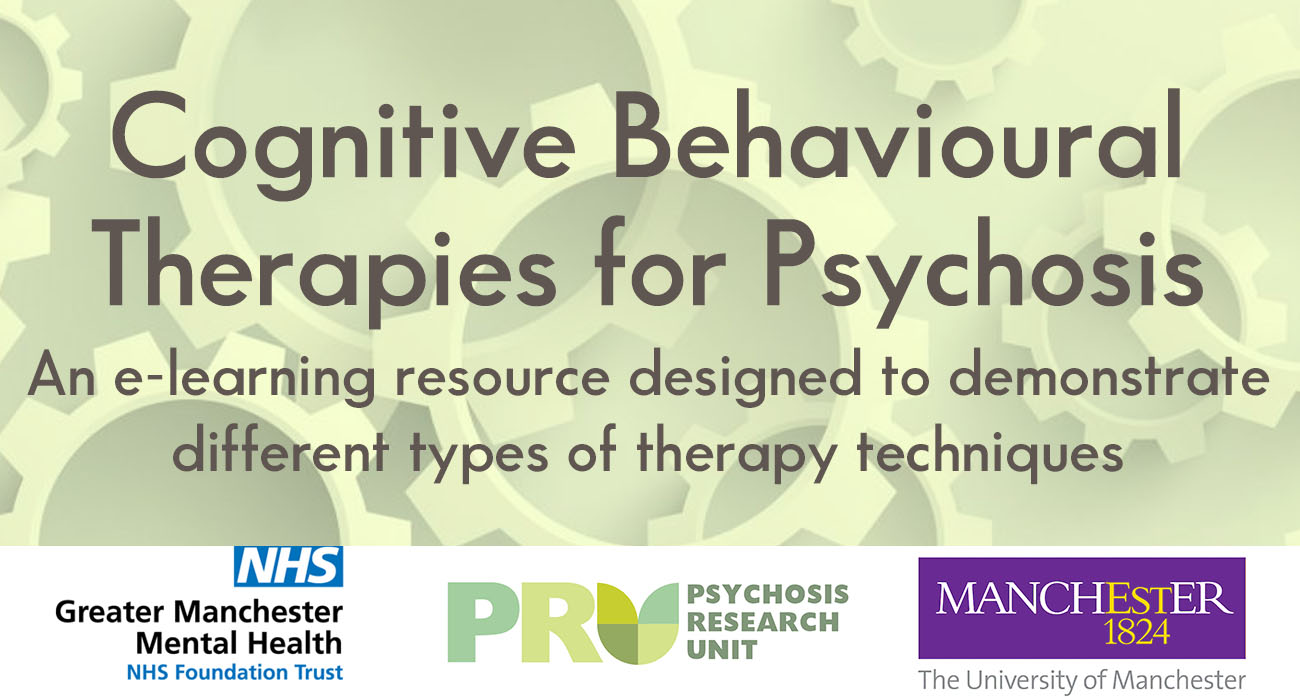
CBT for Psychosis e-Learning Resource Launched!
We are pleased to announce that we have launched an e-learning resource for cognitive behavioural therapies (CBT) for psychosis in collaboration with Health Education England, Greater Manchester Mental Health NHS Foundation Trust, and the University of Manchester. The resource provides training materials and role-play videos to enhance training in the formulation-based approach to CBT that we have been developing for over twenty years.
CLICK HERE
 The development of the e-learning resource was driven by a need to improve access to quality CBT for psychosis. CBT is recommended by the National Institute for Health and Care Excellence NICE CG178 in the clinical guidelines for the treatment of adults and young people NICE 155 with psychosis. In order to improve access to evidence-based treatments, NHS England introduced an access and waiting time standard for all people experiencing a first-episode of psychosis and requires that more than 50% of people experiencing first episode psychosis commence NICE recommended treatment within two weeks of referral and that CBT should be offered as a treatment option.
The development of the e-learning resource was driven by a need to improve access to quality CBT for psychosis. CBT is recommended by the National Institute for Health and Care Excellence NICE CG178 in the clinical guidelines for the treatment of adults and young people NICE 155 with psychosis. In order to improve access to evidence-based treatments, NHS England introduced an access and waiting time standard for all people experiencing a first-episode of psychosis and requires that more than 50% of people experiencing first episode psychosis commence NICE recommended treatment within two weeks of referral and that CBT should be offered as a treatment option.
In order to ensure that staff working in early intervention for psychosis clinics are trained to deliver quality CBT for psychosis, Health Education England funded several in-person CBT for psychosis training courses. The e-learning resource is designed to supplement this direct contact training, or to support students training in more general CBT programs, but is not intended to be a stand-alone certification. The resource may also be of interest to service users or carers who are interested in learning more about CBT.
The resource consists of six modules which guide the learner through the Manualized Protocol we have been developing for the past twenty years. This protocol adheres to the competency framework for CBT for psychosis UCL Research Group and promotes recovery-orientated values Tandfonline.Com
The six modules follow the phases of CBT for psychosis and contain video role-plays by PRU staff demonstrating relevant processes and strategies. Additional information, such as research articles, clinical guidelines, information sheets, and therapy materials are also provided. At the end of each module, a self-assessment allows learners to check their understanding of the material, and a certificate is provided to confirm completion of the program.
We are excited to launch this resource nationally, and hope it will prove to be a valuable supplement to direct contact training programs and help improve access to CBT for people experiencing distressing psychosis.

No Comments
Sorry, the comment form is closed at this time.